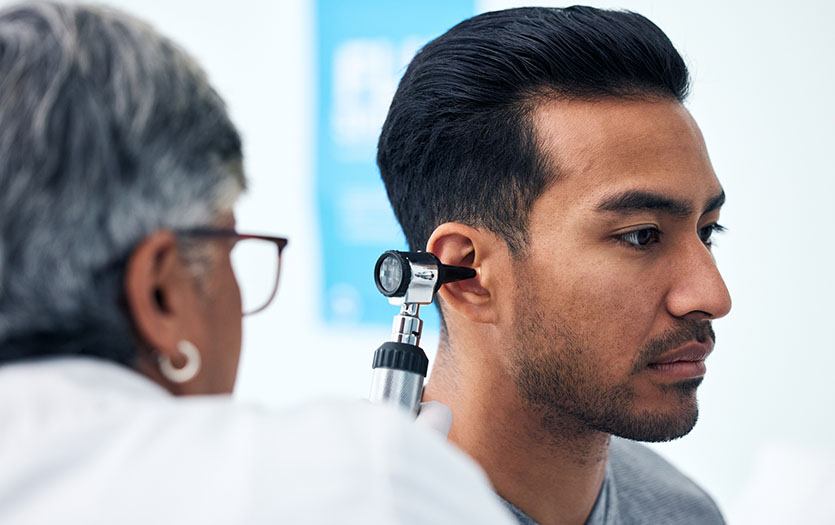
The World Health Organization (WHO) estimates that by 2050, more than 2 billion people will experience some degree of auditory impairment worldwide. Navigating this condition can be challenging for the person affected and their loved ones. Hearing loss, when unaddressed, can affect an individual’s work and home life, leading to increased feelings of loneliness or depression and decreased quality of life. Seeking to understand and finding strategies for improved communication can go a long way to help everyone involved feel more connected and supported.
Types of hearing loss
Hearing loss can happen gradually or suddenly and range from slight to profound. It can affect people of all ages, although it is often considered a natural result of aging.
Conductive hearing loss is when sound is blocked before it reaches the inner ear. Anything that disrupts the passage of sound through the external and middle ear can cause conductive hearing loss. Treating the underlying causes can often reverse it. Known causes of conductive hearing loss include:
- hardened earwax
- perforated eardrum
- a foreign object
- abnormal bone growth
- swelling or a tumor
- fluid from colds or allergies
Hearing loss can also occur due to infection, such as otitis media (inner ear) and external otitis (swimmer’s ear).
Learn the differences between “swimmer’s ear” and a common ear infection.
Sensorineural hearing loss (SNHL) occurs when sound reaches the inner ear, but a problem with the cochlea or nerves prevents proper hearing. It is also the most common form of permanent hearing loss and can occur due to repeated exposure to loud noises or aging. SNHL is typically irreversible, but hearing aids or cochlear implants can help improve hearing.
Presbycusis, commonly referred to as age-related hearing loss, is not necessarily an inevitable part of aging; in fact, many people in their 80s do not experience hearing loss. There is no cure for age-related hearing loss, and it remains unclear if environmental factors such as long-term exposure to excessive noise contribute to reduced hearing ability. However, an individual’s genetics is likely to play a role, as it tends to occur in families. Hearing aids or assistive devices that convert speech to text in real-time are frequently used to treat presbycusis.
Improving communication
Conversations and social interactions can pose unique challenges for individuals with hearing difficulties. It can impact their ability to perceive and process auditory information, leading to misunderstandings, frustration or feelings of isolation. However, there are ways to help lessen the burden and foster inclusive communication.
Here are a few tips to help bridge the gap:
Establish clear communication. Ensure the person is aware that they are being spoken to. It can be helpful to address them by name. Do not speak directly into their ear, but from a short distance so that they can see your face, mouth and gestures. Facial expressions and gestures provide clues about what is being conveyed.
Adjust your volume. Speak slightly louder than usual, slowly and clearly. Refrain from shouting and repeating the same word. If a particular phrase isn’t being understood, find another way to say it.
Encourage active participation. Involve the individual in group discussions to foster a sense of inclusion and respect. Maintain eye contact and acknowledge their presence. If the conversation changes, let them know and avoid discussing them as if they are absent.
Minimize background noises. Turn off the TV or radio, choose a quieter area in a restaurant or sit away from entrances in public spaces.
Getting help for hearing loss
If you or a loved one is experiencing symptoms of hearing loss, such as muffled hearing or difficulty understanding what people are saying, the audiology team at Parkview, Ohio, can help. Our staff specializes in the latest treatment options for hearing loss, and we offer personalized management and treatment options for the hearing impaired. Call 419-636-4517 to make an appointment.
Copyrighted material adapted with permission from Healthwise, Incorporated. This information does not replace the advice of a doctor.



